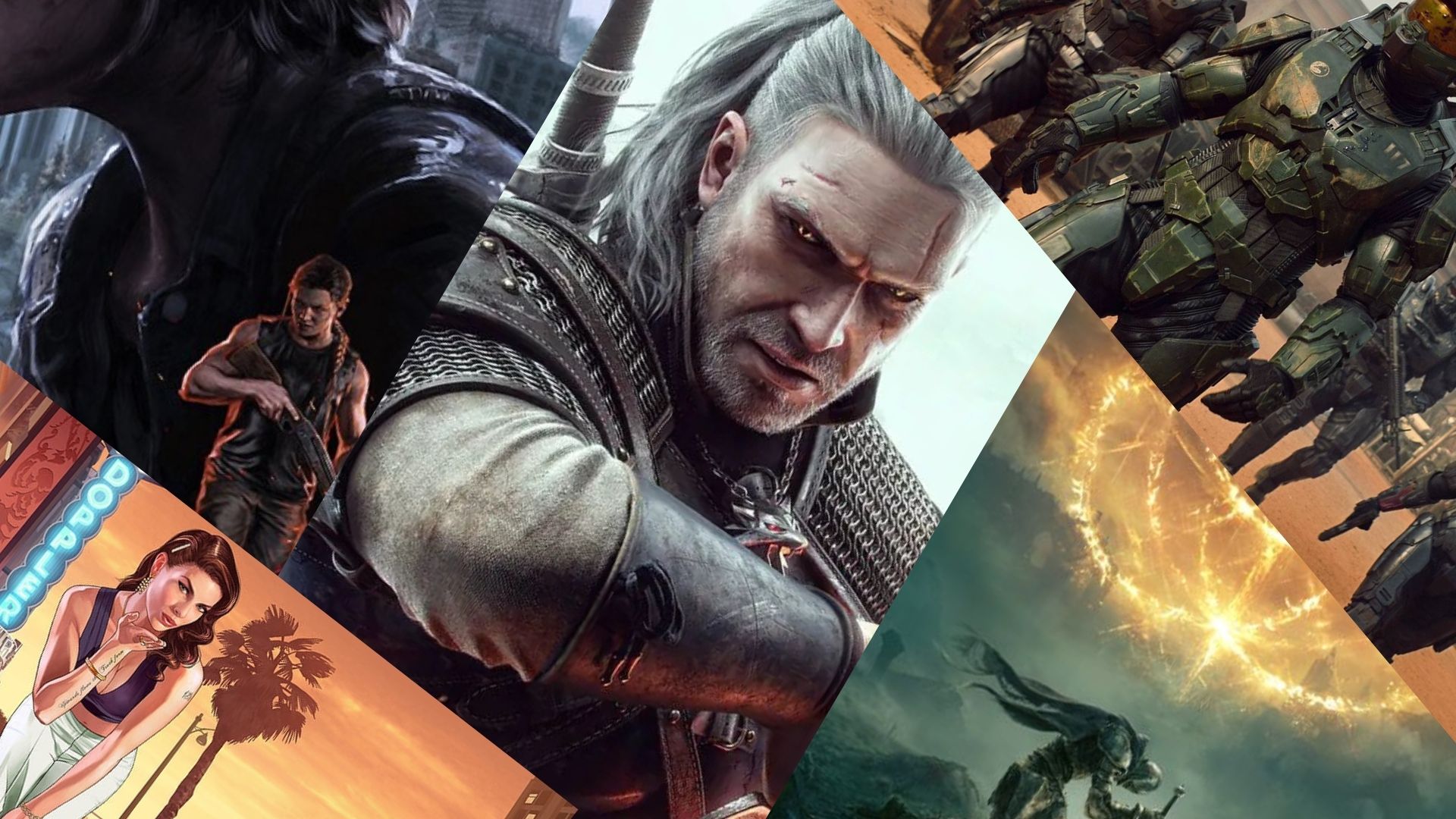Introduction
Remember that electric buzz when the first trailer for Grand Theft Auto V dropped? I was glued to my screen, heart racing, thinking, "This is gonna change everything." Or how about the countdown to Elden Ring's release I swear I refreshed Reddit every hour, dodging spoilers like they were landmines. Those moments? That's the magic of AAA games. They're the gaming world's equivalent of a summer blockbuster, the ones that dominate your feed, spark endless debates, and sometimes even crash servers on launch day. But what really makes a game earn that "AAA" label? Why do they suck us in so deep, and how come some crash and burn despite all the fanfare? Let's dive into this chaotic, multi-billion-dollar universe of AAA gaming and figure out what keeps it spinning.
What Exactly Is a AAA Game?
Alright, let's cut through the jargon. AAA games yeah, you say it like "triple-A," as if you're giving it a five-star review are basically the rock stars of the video game industry. These aren't your quick mobile apps or indie experiments; we're talking massive productions with budgets that could fund a small country. I've seen estimates where games like Red Dead Redemption 2 clocked in at over $200 million, and honestly, it shows in every pixel. Picture this: teams of hundreds, sometimes thousands, of devs, artists, voice actors, and composers slaving away for years. They craft worlds so immersive that you forget to eat dinner because you're too busy exploring.
I remember firing up The Last of Us for the first time the way the rain dripped off Joel's jacket, the creak of abandoned buildings it felt real, like I was there. That's AAA in a nutshell: high-fidelity graphics, cinematic storytelling, and gameplay that's polished to a shine. The term itself borrows from finance, where AAA means the best credit rating, super safe and top-tier. In gaming, it translates to "we poured everything into this." Marketing plays a huge role too. It's not just about the game; it's the hype machine. Trailers that look like Hollywood films, celebrity endorsements, and ads popping up everywhere from billboards to your Instagram feed. When a AAA title launches, it's global domination mode millions of copies sold, servers straining under the weight of excited players. But yeah, that also means when things go wrong, like with Anthem or Fallout 76, the fallout is epic. Pun intended.
How AAA Games Have Evolved
The roots of AAA go way back, but they've morphed into something unrecognizable over the decades. Let's time-travel a bit.
The Early Blockbusters
Think about the '90s that golden era when gaming was exploding out of arcades and into living rooms. Final Fantasy VII on the original PlayStation? That game was a revelation for me as a kid. Those blocky characters and FMV cutscenes blew my mind; it was like watching a movie where I called the shots. Storylines got deeper, with themes of loss, identity, and epic quests that stuck with you long after the credits rolled. Then came the early 2000s with Halo: Combat Evolved. Bungie didn't just make a shooter; they created a universe. I spent countless LAN parties yelling at friends over multiplayer matches, all while unraveling the mystery of the ringworld. Half-Life 2 upped the ante with physics that felt revolutionary picking up crates with the gravity gun? Chef's kiss.
These games weren't just hits; they proved gaming could rival books or films in emotional depth. Budgets were growing, sure, but it was more about innovation than sheer scale. Publishers like EA and Ubisoft started pumping more money in, betting big on franchises. It set the foundation: AAA meant spectacle, but also substance. Without these pioneers, we wouldn't have the monsters we see today.
The Modern Era
Jump to now, and AAA games are on steroids. Grand Theft Auto V's development reportedly topped $265 million, and you feel it in every corner of Los Santos from the bustling streets to the radio stations blasting satirical tunes. I once spent an entire afternoon just driving around, listening to in-game podcasts, forgetting I had a mission. Games like The Witcher 3: Wild Hunt took open-world design to absurd levels. CD Projekt Red crafted a continent so alive, with weather changes affecting gameplay and NPCs with their own routines. I got sidetracked by a side quest about a haunted well and ended up in a multi-hour detour that felt more compelling than some main stories.
Elden Ring, oh boy that's FromSoftware flipping the script on open-world fatigue. No hand-holding, just you, a horse, and a brutal landscape full of secrets. I died a hundred times to that first boss, but each retry felt like progress. Tech advancements play a big part here: ray tracing makes lights bounce realistically, 4K resolutions turn environments into art, and SSDs mean no more loading screens interrupting the flow. Hype cycles have evolved too. E3 might be gone, but now we have State of Play streams, Summer Game Fest, and Twitter (or X, whatever) blowing up with leaks. AAA isn't just a game anymore; it's a shared cultural phenomenon, like when Spider-Man 2 swung onto PS5 and everyone was web-slinging through New York in unison.
What Makes AAA Games Stand Out?
So, why do AAA games feel like a cut above? It's a combo of factors that create this irresistible pull. Let me break it down without the bullet points feels more like a chat that way.
First off, production values are through the roof. Graphics? Lifelike enough to make you question reality. God of War (2018) had me pausing just to admire the frost on Kratos' beard. Sound design? Orchestral scores that swell during boss fights, making your pulse match the tempo. Voice acting? Top-tier talent like Troy Baker or Laura Bailey bringing characters to life. It's all about immersion making you forget you're holding a controller.
Then there's the marketing juggernaut. These games don't sneak out; they storm the gates. Teasers drop months ahead, building anticipation like a slow-burn thriller. I remember the Call of Duty: Modern Warfare reboot trailer explosions, gritty realism, and I was sold before the release date even hit. Ads everywhere: TV spots during the Super Bowl, influencers streaming beta tests, merch tie-ins. It's designed to make you feel like you're missing out if you don't jump in.
Global launches amp up the excitement. No staggered releases; it's day one worldwide. That means coordinating with time zones so everyone from Tokyo to Texas logs in together. Community events, like Fortnite's live concerts, turn it into a party.
But with great power comes great expectations. Fans demand flawlessness tight controls, no bugs, stories that resonate. When it delivers, like in Red Dead Redemption 2's poignant Arthur Morgan arc, it's transcendent. Miss the mark? The backlash is swift and savage. Social media amplifies every gripe, turning minor issues into memes.
Overall, AAA stands out because it's engineered for mass appeal. It's the full package: spectacle, story, and social buzz rolled into one.
Some of the Most Iconic AAA Games
No talk about AAA is complete without shouting out the GOATs. These aren't just games; they're landmarks that redefined the medium. Let's reminisce.

Grand Theft Auto V: Rockstar's magnum opus. Launched in 2013, and it's still printing money through GTA Online. Los Santos is a satirical playground steal cars, pull heists, or just chill on the beach. I once role-played as a taxi driver for hours, picking up NPCs and chatting. The single-player story with three protagonists? Genius switcheroo mechanics. It's sold over 185 million copies insane.
The Witcher 3: Wild Hunt: If RPGs had a king, this is it. Geralt of Rivia's quest to find his daughter in a war-torn world is epic, but the side content steals the show. Bloody Baron questline? Heart-wrenching. I romanced Yennefer, fought griffins, and brewed potions like a pro. Expansions like Blood and Wine are basically full games. It's the benchmark for narrative depth.
The Last of Us Part II: Naughty Dog's sequel divided fans, but damn, it hit hard. Ellie's revenge tale explores cycles of violence in a post-apocalyptic world. The gameplay stealth, crafting, brutal combat is tense as hell. I ugly-cried at certain moments (no spoilers). It's proof games can tackle mature themes like loss and morality.
Elden Ring: 2022's surprise hit. Open-world soulslike with George R.R. Martin's lore? Yes please. The Lands Between is vast, unforgiving, and beautiful. I explored caves, toppled demigods, and co-oped with strangers. That sense of discovery finding a hidden boss after hours of wandering is unmatched.
Halo Series: Master Chief's saga started it all for Xbox. Halo 3's campaign had me on the edge, but multiplayer was legendary. Split-screen with buddies, tea-bagging enemies good times. Infinite's trying to recapture that, with mixed results, but the originals? Timeless.
These icons didn't just entertain; they influenced everything from design to pop culture. GTA memes, Witcher Netflix show AAA's ripple effect is huge.
The Not-So-Great Side of AAA
Alright, time to flip the coin. For all their glory, AAA games have some ugly underbellies that we can't ignore.
Overhyped but Underbaked Launches
Hype is a double-edged sword. Cyberpunk 2077 promised the moon: a futuristic RPG with Keanu Reeves. I pre-ordered, hyped beyond belief. Launch day? Crashes, missing features, NPCs T-posing like statues. It was a disaster, especially on last-gen consoles. CDPR patched it eventually, but the damage was done refunds galore, stock prices tanked. No Man's Sky had a similar rough start, overpromising procedural worlds that felt empty. It teaches us: bigger budgets don't guarantee quality. Sometimes, ambition outpaces reality.
Crunch Culture and Developer Burnout
Behind the scenes, it's grim. "Crunch" means mandatory overtime, 80-hour weeks, sleeping under desks. Stories from Rockstar (Red Dead 2) and Naughty Dog (The Last of Us II) reveal exhaustion, mental health struggles, family time sacrificed. I read an interview where a dev said they missed their kid's birthday for a deadline. Unions are forming, but change is slow. We love the games, but at what human cost? It's a wake-up call for the industry.
Playing It Safe and Lack of Innovation
With so much money on the line, risks are minimized. Sequels reign supreme: FIFA, Madden, another Far Cry. I enjoy Assassin's Creed Valhalla, but climbing synchronization points for the umpteenth time? Yawn. Original IPs are rare; remakes like The Last of Us Part I cash in on nostalgia. It's profitable, but stifles creativity. Remember when BioShock shocked us with its twists? We need more of that boldness.
Rising Costs and Microtransactions
Games hit $70 now, up from $60. Add DLC, battle passes, loot boxes it's nickel-and-diming. Destiny 2's expansions add up; I've spent more post-purchase than on the base game. Live-service models like Apex Legends hook you with free entry, then tempt with skins. It's addictive, but feels predatory, especially with gambling-like mechanics. Regulators are eyeing it, but for now, your wallet beware.
AAA vs. Indie Games
This is where the contrast shines. AAA is the Hollywood epic big, flashy, crowd-pleasing. Indies? They're the indie films: intimate, experimental, soulful.
Take Hades by Supergiant Games a rogue-like where you escape hell as Zagreus. Made by a small team, it's got tight combat, witty dialogue, and replayability that kept me hooked for 100 hours. Cost? $25. Compare to a $70 AAA with similar playtime but less heart.
Undertale, Toby Fox's solo project, subverts RPG tropes with meta humor and emotional punches. It made me rethink violence in games. Hollow Knight: $15 metroidvania masterpiece with hand-drawn art and lore deeper than some AAA titles. I explored Hallownest for weeks, piecing together the story.
Indies innovate because they must limited resources force creativity. Celeste's platforming tackles mental health; Cuphead's animation is a love letter to 1930s cartoons. No massive marketing, but word-of-mouth builds cults.
Don't get me wrong; I love both. AAA for the wow factor diving into Uncharted's set pieces feels like an action movie. Indies for freshness after a heavy AAA story, something light like Stardew Valley is therapy. The ecosystem thrives on variety; AAA funds tech advancements that trickle down to indies via engines like Unreal.
What's Next for AAA Games?
Peering into the crystal ball, AAA's future is exciting, with tech reshaping everything.
Cloud Gaming and Subscription Services
Xbox Game Pass, PlayStation Plus access hundreds of games for a monthly fee. I binge Starfield without buying it outright. Cloud streaming via GeForce Now means playing AAA on a potato PC, as long as your internet's solid. Lag's an issue, but improving. It democratizes gaming, but what about ownership? If a game leaves the service, poof gone.
AI and Procedural Generation
AI's the game-changer. Imagine NPCs with real personalities, adapting to your playstyle. Procedural tech in No Man's Sky (post-updates) creates infinite planets. Future AAA could have dynamic stories branching infinitely. But ethical concerns: AI replacing artists? Or enhancing creativity? I'm optimistic tools like that could make worlds feel truly alive.
Cross-Play and Platform Unity

Barriers crumbling: Fortnite lets me play with console friends on PC. More AAA adopting this Call of Duty, Rocket League. Mobile integration too, like Genshin Impact across devices. It fosters communities, but cheating across platforms? Needs better anti-cheat.
Live-Service Dominance
Games as services: constant updates, events, seasons. Fortnite's battle royale evolves weekly; World of Warcraft's been going strong for decades. AAA like The Division 2 thrive on this, but burnout's real grinding for loot feels like work. Balance is key; done right, it's endless fun.
VR/AR Integration
With PSVR2 and Meta Quest, AAA dipping toes Half-Life: Alyx was mind-blowing in VR. Future? Augmented reality overlays in real life? Pokémon GO hints at it, but AAA scale could revolutionize.
Sustainability and Diversity
Pushing for greener practices digital distribution cuts plastic. More diverse stories: The Last of Us' queer representation, Horizon's strong female lead. AAA leading on inclusivity? Hope so.
Final Thoughts

AAA games are the titans striding through gaming's landscape setting trends, igniting passions, and occasionally stumbling spectacularly. From Final Fantasy VII's emotional pixels to Elden Ring's punishing beauty, they've elevated the medium to art. Yet, the shadows loom: exploitative crunch, homogenized content, and ever-climbing costs remind us perfection's a myth.
Indies keep the fire alive with raw innovation, proving size isn't everything. As AAA hurtles forward with AI, clouds, and endless worlds, I wonder: will it embrace risks or cling to formulas? Either way, I'm strapped in, controller ready. Gaming's never been bigger, and whether you're raiding tombs in Tomb Raider or farming in an indie sim, there's joy in every pixel. Here's to more adventures may your saves be safe and your frames steady.
